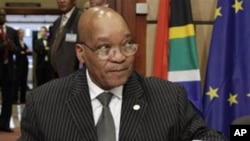South African President Jacob Zuma, mediator in the perennially troubled national unity government in Zimbabwe, has obtained concessions from all of the co-governing parties to move legislation providing for broad reform of Zimbabwe’s electoral system in the interest of ensuring a free and fair environment for the next national ballot.
Justice Minister Patrick Chinamasa has gazetted the long-awaited electoral amendment bill after resisting pressure from Pretoria for almost two years, backed by hardliners in President Robert Mugabe's former ruling ZANU-PF party.
The reform legislation restricts police involvement in the electoral process and addresses political violence. It grants wide powers to the Zimbabwe Electoral Commission to run elections, obliging it to announce all results within five days of the ballot.
The commission in place in 2008 took five weeks to post first-round presidential ballot results. The legislation also restricts the use of postal ballots to government officials serving abroad and polling officers who will be on duty on election day.
Kent University law lecturer Alex Magaisa told VOA Studio 7 reporter Blessing Zulu that the proposed reforms are a step inn the right direction.
In other political developments, the standing committee of the Movement for Democratic Change formation led by Prime Minister Morgan Tsvangirai has instructed Mr. Tsvangirai and Finance Minister Tendai Biti, party secretary general, to tell the Cabinet to increase civil servant salaries and to fund increased costs by cutting other expenditures.
Sources said the ZANU-PF politburo was also meeting to discuss public sector pay.
Finance Minister Biti said foreign trips – including those by President Mugabe to the Far East where he has been receiving medical attention – could cost up to US$50 million this year if they are not curbed. So far the bill has risen to US$25 million.
The issue of state worker salaries has become a political football between ZANU-PF and the MDC. ZANU-PF has accused the MDC of attempting to block the increase which the president promised state workers several months ago. The MDC says ZANU-PF wants to shield thousands of ghost workers added to public payrolls during the previous Mugabe administration, and has resisted transparency on receipts Marange diamond sales.
Tsvangirai MDC spokesman Douglas Mwonzora said his party will table proposals on how the government can increase revenues to offset higher state wage costs.





